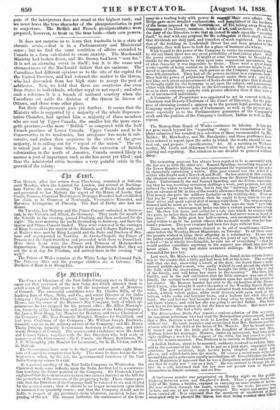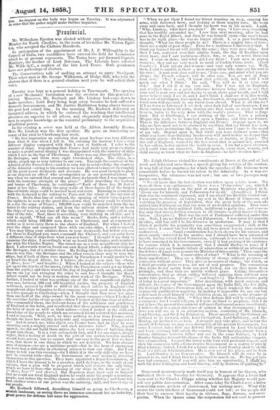3111trupglig.
The Court of Directors of the East India Company met on Monday to carry out that provision of the new India Act which directed them to select seven of their colleagues to fill the important post of Members of Council. The successful candidates were Mr. Charles Mills, of the banking fu-m of Glyn, Mills, and Co., and senior Director of the India Company ; Captain John Shepherd, lately Deputy-Master of the Trinity House, and Governor of the Hudson's Bay Company, both of which ap- pointments he has resigned for his present office ; Mr. Elliot Macnag,h- ten, formerly of the Indian bar and ex-Chairman of the India Company ; Sir James Weir Hogg, late Member for Honiton, and twice Chairman of the Company ; Mr. Ross Donnelly Mangles, Member for Guildford, and last year Chairman of the Company ; Mr. William Joseph Eastwick, formerly captain in the military service of the Company ; and Mr. Henry Thoby Prin.sep, formerly Government Secretary in Calcutta, and after- wards Member of Council. The unsuccessful candidates were Mr. Astell and Colonel Sykes, together with the five Directors who held seats as nominees of the Government—Sir F. Currie, 6ir Henry Rawlinson Mr. J. P. Willoughby (the Member for Leomister), Sir R. H. Vivian, and Sir G. Pollock.
The Government have now to do their part and nominate eight Mem- bers of Council to complete that body. This must be done before the 1st September, when, by the Act, the governmental functions of the East India Company ceases to exist.
At a general meeting of the East India Company on Wednesday, the Chairman made some remarks upon the India Act that led to a conversa- tion touching the future position of the Company. Sir Frederick Currie explained that he took measures to have two clauses inserted in the bill for the protection of the interests of the proprietary body. Those clauses pro- vide that the Directors of the Company shall be reduced to six and elected by the general court ; that it should be no longer incumbent upon them to summon f..ur quarterly courts ; and that the Company should not be liable in respect of any pecuniary claim whatever, incurred before the ris4ng of the act. The dews authorize the continuance of the com- pany as a trading body with power to manage their own affairs, lb. Helps gave more detailed explanations, and complained of the hardness of the terms imposed by the GoVernment, of the taking away from the Company of its library, museum, works of art, and archives. It will lie the duty of the Directors to that no inroad is made upon the "security fund," to deal with any proposal for Vie redemption of their stock ; to see' that dividends are duly paid, and transfers of stock registered. As a por- tion of the building in Leadenhall Street has not been granted to Company, they will have to look for a place of business elsewhere. With regard to the power of the Company to revive its commercial trade he did not think there was any great probability of that taking place. seal the power certainly exists. It might at some future time be thought de- sirable for the proprietors to enter upon some commercial speculation, bat of what character it was impossible to divine. There were a great mane works capable of being carried on in India in which persons might be in".. duced to speculate. However, such powers as the Company originally had were left untouched. They had all the powers incident to a corporate body They had the power of petitioning Parliament under their seal; and if at any time such great misgovernment of India should take place that it should be thought right for the Company to act upon the subject, and remonstrate either with their fellow-subjects or the Government, they would be able to do so in their corporate capacity with greater efficiency than if they were a set of unconnected individuals.
A Committe of Proprietors was appointed to act in concert with the Chairman and Deputy-Chairman of the Court of Directors, for the pur- pose of obtaining counsel's opinion as to the present legal position of the Company under previous acts of Parliament, as well as the present act, more especially as to the Parliamentary guarantee of the Company's stock and the position of the Company's creditors, Indian as well as Eu- ropean.
The Metropolitan Board of Works continues its labours. It has not yet gone much beyond the "reporting" stage. An examination of the plans submitted has resulted in a selection of those recommended by Mr. B.idder, Mr. Hawkesley, and Mr. Bazalgette ; and those gentlemen have been ordered to report, upon the order in which the works should be car- ried out, and prepare "specifications," &c. At a meeting on Wednes_ nesday, Mr. Leslie and Alderman Cubitt were for delay and further in- quiring and reporting. But nineteen to one decided to proceed without delay.
The recruiting sergeant has always been reputed to be as successful with the fair sex as with the other sex. Samuel Spurling, recruiting sergeant of the Tower Hamlets Militia, has just maintained the reputation of his order by shamefully outwitting a widow. This poor woman was the relict of a soldier who fought under Havelock and Neill. On her arrival in this country she obtained some small weekly allowances from the Mutiny Fund and Clive Fund. Unfortunately she met Samuel Spading, and the fellow, represent- ing that he was receiving seventeen shillings a week, part pension, not only induced the widow to marry him, butte buy the "marriage lines" and ob- tain an advance of 10/. in lieu of the weekly allowance from the Mutiny Fund. This money she gave the military Lothario on the wedding-day. Even on that day he "paid more attention than he ought to have done to two sol- diers' wives and spent a great deal of money with them." The next morning Samuel said he must go to business. His bride says she then "gave him very good advice, whereupon he broke out into a violent passion and struck her. He then left home and called for a cab, into which he entered with two girls, no better than they should be, and she had never seen or heard of him since." Mr. Selfe gave her half-a-crown, and recommended the de- luded widow to go to the parish officers who no doubt would stop her hus- band's pension. The poor creature had been two days without food.
Three cases in which parents desired to be rid of troublesome children came before the Worship Street Magistrate, on Tuesday. In all these cases the parents wished to lodge their offspring in a reformatory. In one case the father complained bitterly that his son, ten years of age only, was such a thief—" he is wholly irreclaimable, he robs me of everything "—that he would neither contribute anything to his support nor admit him into his house again. The boy had stolen seventeen shillings. Mr. D'Eyncourt remanded the poor boy.
Last week, Mr. Masters who resides at Dalston, found on his return from a trip to the seaside that a little girl had been left at his house. The servant said that one day, answering a knock at the door, she found there a well- dressed middle-aged woman, who coolly walked in and placed the child in the hall, with the observation"I have brought the little girl who is one of the family, and will bring her sister in the morning." She then left i
hastily, and n the full conviction that the little stranger was one of the family, the servant bestowed every attention upon her until the return of her master. Mr. Masters handed her over to the authorities of the Shore- ditch Union, who brought it under the notice of the Worship Street Magis- trate. The deserted girl wore a claret-coloured frock trimmed with black velvet, a black velvet jacket, white twill drawers with open work at the bottom white socks and lavender boots, and a leghorn hat with lilac ii- band. 'She said her ma' had brought her a long away by train, but she did not know whence, and told her she was going to see her father. She then took her to the house spoken of, but she knew no one there. Her name was Louisa Turner. She had a baby sister. The Birmingham Daily Post reports a curious solution of this mystery. An ingenious policeman who had read the Metropolitan police-report, heard that a Mrs. Bertram went last week to London with a girl and returned without one. He made inquiries and ascertained that Mrs. Bertram was the woman who left the child at the house of Mr. Masters. But he heard more. It turned out that the little girl is the daughter of Masters and Mrs. Bertram before her marriage. Masters, under an agreement, had long paid eight shillings a week for the support of the child, but had ceased to pay it when the woman married. Mrs. Bertram is in custody at Birmingham. A foolish Italian, about to be married, suddenly resolved to exhibit him-
self in the costume of his bride. So he put on a pink skirt, expanded with crinoline, laced petticoat, high heeled boots, ringlets and light kid gloves, and sallied forth into the streets. Of course a crowd soon collected around him, and a policeman rapidly marched him off. Brought before the Bow Street Magistrate it appeared that he was a Neapolitan artist of local repute, and that he really was out on a lark." He was ordered to change lus at- tire in a cell, informed that the law does not permit men to disguise themselves in female costume, and set free.
A barbarous murder was perpetrated on Monday night on the public highway between acton and Shepherd's Bush. There a groom found the body of Mr. Gates, a builder, -engaged in carrying on some works at Acton. He was stabbed through the .heart, wounded in the neck, his nose was broken, and one of his eyes _nearly destroyed. His watch and.money had been carried off. It is supposed that the murderer or murderers atfirst attempted eialT to phmder MT. Oates, but that being resisted they Idled him, An inquest on the body was begun on Tuesday. It was adjourned in order that the police might -make further inquiries.



























 Previous page
Previous page